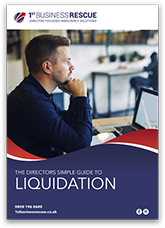Are You Considering Liquidation? Read this First.
If you’re considering liquidation, then we’ve worked with enough businesses to know the pain and emotional anguish that brings you to the point where you’re considering liquidation, and that’s why we work exceptionally hard to make the process pain-free and uncomplicated as we possibly can.
With our many years of experience assisting and helping directors we fully appreciate the pressure that you can be under. Our initial focus is always on you , the director and our knowledge will help relieve some of that pressure
Why not speak with one of our experienced advisors today? Either call us now on 0800 098 8365, message us on 07737574361 or Make A Free Enquiry and we will be delighted to help you.
Watch This Video To See What Our Clients Say About Our Business Rescue Services
If your limited company is insolvent, then a Creditors’ Voluntary Liquidation (CVL) will bring the formal end to the company and all unsecured debts will be written off. However, before deciding on any possible course of action, we strongly advise you to contact our team at 1st Business Rescue. We will be able to consider your company’s specific circumstances and advise you whether a voluntary liquidation would be the most appropriate course of action. We will also help you understand if there are any potential pitfalls for you personally if you place your company into liquidation. If liquidation is indeed the best way forward for you and your business then we can start the process straight away.
What exactly is a CVL?
A CVL is a formal insolvency process that is used to close down insolvent companies. Unlike a compulsory liquidation, a CVL is instigated voluntarily by a company’s directors. Whereas, in a compulsory liquidation, a company’s creditors apply for the liquidation. Remember that if your business has taken a bounce back loan then you are going to be unable to strike the company off and you could land yourself in serious trouble if you attempt to use this loophole to close your company. If your business has debts that it cannot repay then a liquidation is likely to be your best course of action, particularly because you will have more control over the company’s closure, rather than waiting for the creditors to issue a winding-up petition.
A voluntary liquidation needs to be carried out by a licensed insolvency practitioner who will act as the liquidator. If you’re considering liquidation, you must ensure that you check what the implications will be for the directors of the company should the business be placed into liquidation.
In a Voluntary Liquidation, the following things are achieved:
● All outstanding unsecured liabilities are written off, including HMRC, Bounce Back Loans and trade suppliers (unless you have given a personal guarantee – if you have, talk to us immediately)
● Demands from your creditors are handled by the insolvency practitioner
● Any legal action against your company is ended
● Your company is closed down completely, without delay
● You can start to focus on your future
Many of those things may sound attractive, but in order to understand whether voluntary liquidation is possible for your business (and the right thing to do), it’s vital you fully understand your position now, so there are no surprises further down the line.
There are a number of different options when it comes to company closure dependant on your circumstances and what your plans are for the future.
If you don’t want to continue the business even under a different guise than a creditors voluntary liquidation may be the best possible option for you.
One of the options that you may want to consider if you believe your business would be viable without the legacy debt dragging it down is a pre-pack liquidation, this could allow you to restart your business without any historic debt.
A pre-pack liquidation is a procedure that allows the Directors of an insolvent company to purchase any assets from the insolvent company before any formal insolvency procedure is entered into.
This allows Directors of an insolvent company to legally purchase the required assets into a new company, enabling the new company to continue without the historic unsecured debts. Due to the distressed state of the failing company, a rapid sale of its assets is often required. There are a lot of factors taken into consideration in valuing a distressed companies’ assets, this can be explained in more detail during a free consultation with us.
Once the purchase of the assets is agreed the insolvent company is then placed into formal liquidation.
Your responsibilities as a company director
If your business is in financial difficulty, as a responsible director it is imperative that you take advice as soon as you believe there is an issue with your business.
This will draw a line in the sand and could protect you from any accusation that you have been trading a business while insolvent.
The sooner you get help, the better the outcome will be. 100% of our clients wished they had called us sooner!
If you have any doubts, concerns, or worries about your business, don’t think you’re wasting our time, we are happy to give you some free advice to put your mind at ease.
MOST COMMONLY ASKED QUESTIONS ABOUT LIQUIDATION
Here are some of the most frequently asked questions we receive on calls with Company Directors:
What happens to my Bounce Back Loan in liquidation?
Your bounce-back loan is an unsecured debt and is included in the liquidation. As long as it was applied for in the correct manner and has been spent as per the terms and conditions, it will be written off.
Does a liquidation affect my credit rating?
Directors and shareholders are not personally liable for their company debts. This is one of the key reasons why people incorporate Ltd companies, as it limits the liabilities of the directors and shareholders should the company fail. If a company is placed into liquidation, it is not shown on the personal credit reports of the directors or shareholders.
What are the things that I need to check before I liquidate?
The key things that we help you to check before deciding to liquidate are overdrawn directors’ loan accounts and any preferential payments. An insolvency practitioner can pursue you for both of these, and it’s critical that you understand whether you have them, and more importantly, how you plan to deal with them should the company goes into liquidation.
Can the director claim redundancy?
Yes, if the director has received their salary through the PAYE scheme for over two years. This claim is made through the National Insurance Fund; the average claim is £9,000 and can be used to fund the cost of any liquidation.
What happens to my business’s assets?
The assets will be sold and used to pay back creditors. It’s also possible for you to purchase the assets from the old company; in most cases, you can agree to pay for the assets over a period of time.
Can I reuse the company’s name?
In some circumstances yes, you can, but there are some strict legal guidelines that you will need to follow which we will guide you through.
How long does it take to go into liquidation?
Your company can be placed into liquidation in as little as two weeks. Firstly, we would go through your situation in detail and make sure you understand all the options available. If liquidation is indeed the best option for the business, we will send you a detailed proposal and start the process. Once you appoint a liquidator, they will deal with the company’s creditors going forward.
What happens to my staff?
A Creditors Voluntary Liquidation is the formal closure and end of the business, so all the staff will be made redundant. The staff will be able to make a claim for redundancy and any unpaid earning from the National Insurance Fund. We can advise on how they can do this.
If you have any other questions or would like more detailed advice on your situation, please get in touch with us for a free, no-obligation chat.
Please get in touch and we’ll come back to you without delay.
Call 0808 196 8600
Text 07737 574 361
Complete a Free Online Enquiry

 If you are a director and considering closing your company by liquidation or insolvency, you must read our free guide to discovering how to do it the right way. Simply click the button below and enter your details below to receive this free guide now:
If you are a director and considering closing your company by liquidation or insolvency, you must read our free guide to discovering how to do it the right way. Simply click the button below and enter your details below to receive this free guide now:


